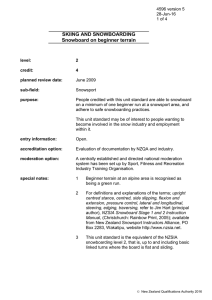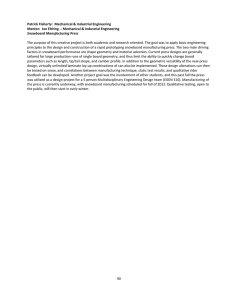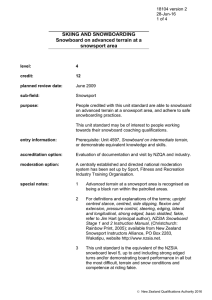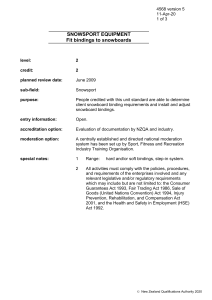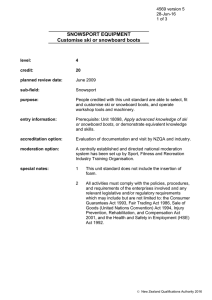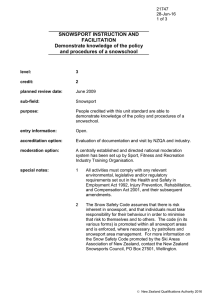SKIING AND SNOWBOARDING Snowboard on intermediate terrain
advertisement
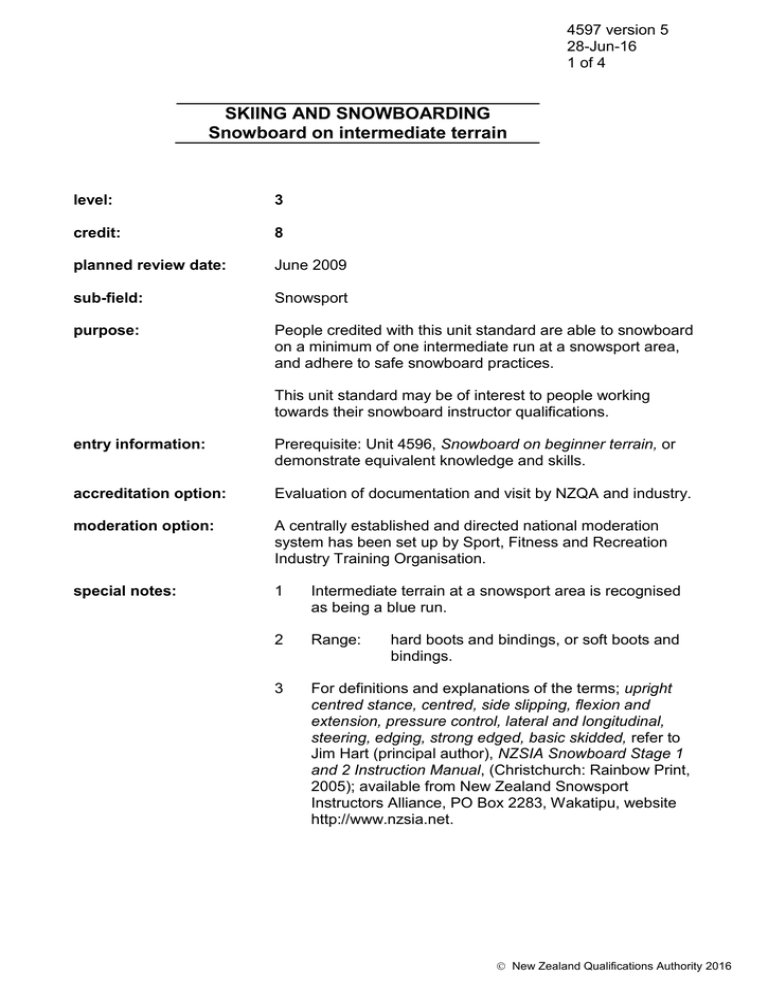
4597 version 5 28-Jun-16 1 of 4 SKIING AND SNOWBOARDING Snowboard on intermediate terrain level: 3 credit: 8 planned review date: June 2009 sub-field: Snowsport purpose: People credited with this unit standard are able to snowboard on a minimum of one intermediate run at a snowsport area, and adhere to safe snowboard practices. This unit standard may be of interest to people working towards their snowboard instructor qualifications. entry information: Prerequisite: Unit 4596, Snowboard on beginner terrain, or demonstrate equivalent knowledge and skills. accreditation option: Evaluation of documentation and visit by NZQA and industry. moderation option: A centrally established and directed national moderation system has been set up by Sport, Fitness and Recreation Industry Training Organisation. special notes: 1 Intermediate terrain at a snowsport area is recognised as being a blue run. 2 Range: 3 For definitions and explanations of the terms; upright centred stance, centred, side slipping, flexion and extension, pressure control, lateral and longitudinal, steering, edging, strong edged, basic skidded, refer to Jim Hart (principal author), NZSIA Snowboard Stage 1 and 2 Instruction Manual, (Christchurch: Rainbow Print, 2005); available from New Zealand Snowsport Instructors Alliance, PO Box 2283, Wakatipu, website http://www.nzsia.net. hard boots and bindings, or soft boots and bindings. New Zealand Qualifications Authority 2016 4597 version 5 28-Jun-16 2 of 4 SKIING AND SNOWBOARDING Snowboard on intermediate terrain 4 This unit standard is the equivalent of the NZSIA snowboarding level 4, that is, up to and including strong edged turns where the board maintains an edge angle. 5 The Snow Safety Code assumes that there is risk inherent in the sport of skiing (alpine, telemark, snowboarding), and that individuals must take responsibility for their behaviour in order to minimise that risk to themselves and to others. The code (in its various forms) is promoted within all snowsport areas and is enforced, where necessary, by patrollers and snowsport area management. For more information on the Snow Safety Code promoted by the Ski Areas Association of New Zealand, contact the New Zealand Snowsports Council, PO Box 27501, Wellington. 6 There are minimum assessor requirements for assessment against this unit standard. The details of these requirements are available on the Sfrito website http://www.sfrito.org.nz/. Elements and Performance Criteria element 1 Snowboard on a minimum of one blue run at a snowsport area. performance criteria 1.1 Trainee demonstrates warm up and stretching exercises as outlined in the NZSIA Snowboard Division Manuals. 1.2 Snowboarding is demonstrated with an upright centred stance. 1.3 Snowboard techniques in basic skidded turns and strong edged turns are executed using a blend of the movements. Range: movements must include but are not limited to – steering, edging, pressure control. New Zealand Qualifications Authority 2016 4597 version 5 28-Jun-16 3 of 4 SKIING AND SNOWBOARDING Snowboard on intermediate terrain 1.4 Strong edged turns are demonstrated through the fall line. Range: 1.5 Speed is controlled with the shape of the turn using a blend of the movements and the turn-shape adapted for conditions and terrain. Range: 1.6 turns must include but are not limited to medium radius and long radius. movements must show but are not limited to – steering, edging and pressure control. Snowboard, boot, and binding options are described in relation to their performance characteristics. Range: performance characteristics must outline but are not limited to – side-cut, overall length, effective edge, forward lean, stance width, stance angle. element 2 Adhere to safe snowboarding practices. performance criteria 2.1 Explanation identifies the importance of comfort and safety when selecting a snowboard, boots, bindings and wrist guards for an intermediate snowboarder. Range: snowboard length, boot type. 2.2 Explanation identifies the functions of snowboard, bindings including the retention device, boots and wrist guards; one of which must be a safety function. 2.3 Snowboarding skills are used to avoid hazards. Range: hazards may include but are not limited to – other snow users, lift queues, snowsport area machinery and signage, bluffs, rocks. 2.4 All snowsport area signs and regulations are complied with. 2.5 The Snow Safety Code is explained and snowboarding practice complies with the code. New Zealand Qualifications Authority 2016 4597 version 5 28-Jun-16 4 of 4 SKIING AND SNOWBOARDING Snowboard on intermediate terrain Comments on this unit standard Please contact the Sport, Fitness and Recreation Industry Training Organisation info@sfrito.org.nz if you wish to suggest changes to the content of this unit standard. Please Note Providers must be accredited by the Qualifications Authority or a delegated interinstitutional body before they can register credits from assessment against unit standards or deliver courses of study leading to that assessment. Industry Training Organisations must be accredited by the Qualifications Authority before they can register credits from assessment against unit standards. Accredited providers and Industry Training Organisations assessing against unit standards must engage with the moderation system that applies to those standards. Accreditation requirements and an outline of the moderation system that applies to this standard are outlined in the Accreditation and Moderation Action Plan (AMAP). The AMAP also includes useful information about special requirements for providers wishing to develop education and training programmes, such as minimum qualifications for tutors and assessors, and special resource requirements. This unit standard is covered by AMAP 0050 which can be accessed at http://www.nzqa.govt.nz/site/framework/search.html. New Zealand Qualifications Authority 2016
